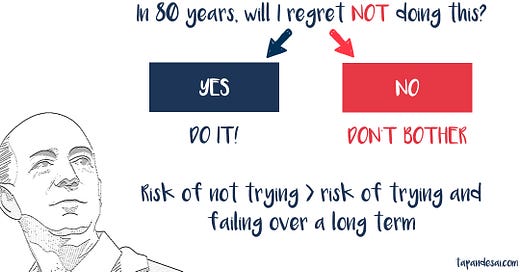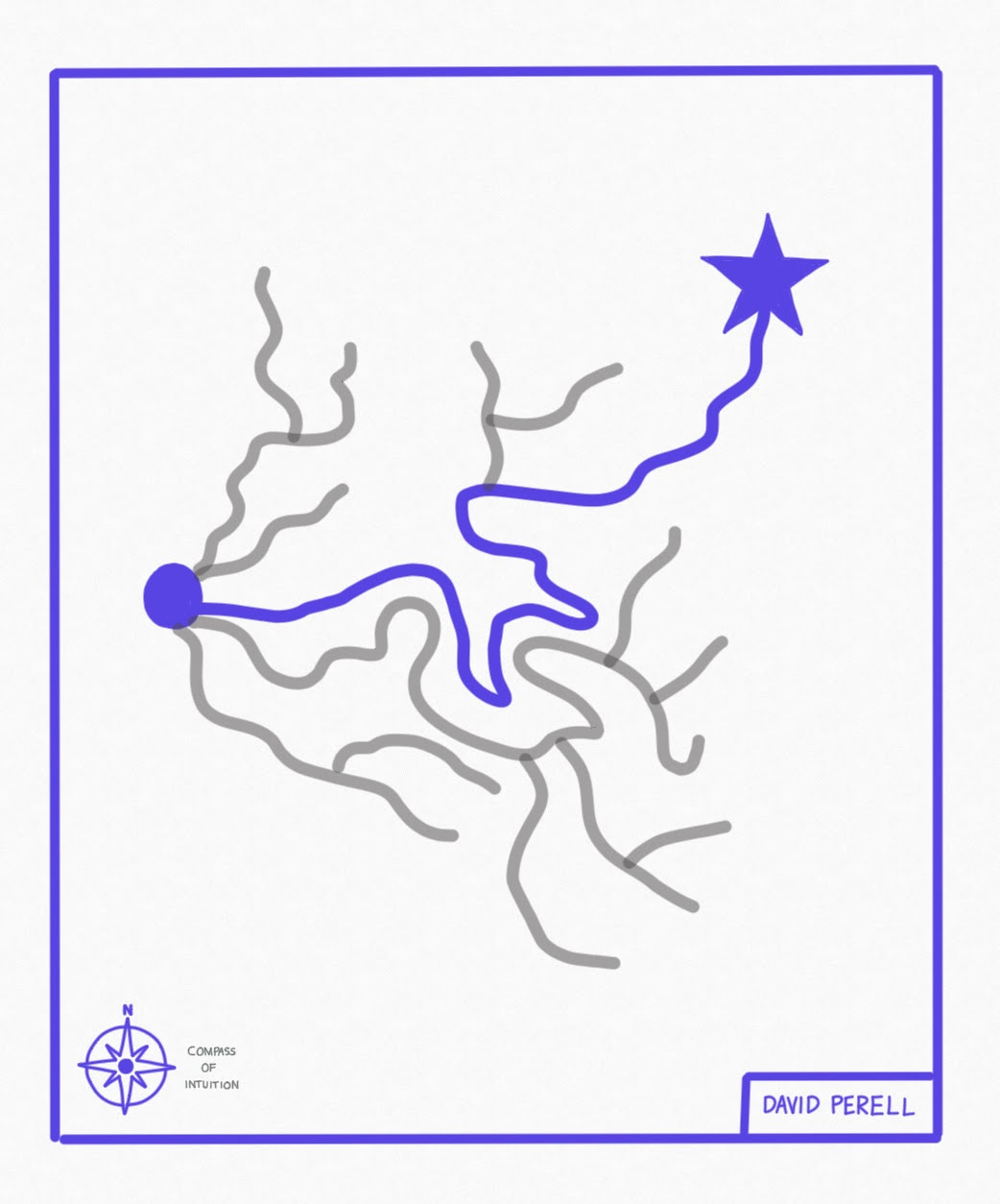MONTHLY MULLING 💡
Treat Yo' Shelves Is Back, On Real Knowledge, and Regret Minimization Framework
Hi👋,
Tapan here.
Monthly Mulling is a newsletter sending the best ideas from the web to your inbox for free. High signal. Low noise.
If you were forwarded this email, you can subscribe here and join a community of 170+ readers.
Happy Sunday y’all!
Treat Yo’ Shelves is back! After almost 3 months, I have picked up reading again. So if you liked that section of the newsletter, just scroll down :)
In the past two weeks, I have read two books and am on my way to finishing the third one. What changed? I switched to the Kindle app. For good.
It was a no-brainer at this point and suited my reading style.
Pros:
I can read with my lights off
I can read while lying down
I can take detailed notes for my Notion database
I read quicker on screen rather than on paper
Easier to move and travel
Con:
It’s not a paper book
The pros rather outweighed the cons and the con I could live with. Do you read on Kindle or paper-based? Would love to know your thoughts.
Moving on🚀
💭MULLING
😁 Minimizing Regrets In Life – A Mental Framework (Article - 6 mins)
I published another article this month and it’s on a framework made famous by Jeff Bezos called Regret Minimization Framework.
Here is an excerpt from Bezos explaining the framework.
The framework I found, which made the decision incredibly easy, was what I called — which only a nerd would call — a “regret minimization framework.” So I wanted to project myself forward to age 80 and say, “Okay, now I’m looking back on my life. I want to minimize the number of regrets I have.”
I knew that when I was 80 I was not going to regret having tried this. I was not going to regret trying to participate in this thing called the Internet that I thought was going to be a really big deal. I knew that if I failed I wouldn’t regret that, but I knew the one thing I might regret is not ever having tried. I knew that that would haunt me every day, and so, when I thought about it that way it was an incredibly easy decision.
Regret Minimization Framework helps you focus on the long-term. It helps you to step away from your day-to-day short-term activities and project yourself way into the future. When you are 80 and ask a simple question – will I regret NOT doing this?
Will I regret not taking this job when I am 80?
Will I regret not starting my YouTube channel when I am 80?
Will I regret not marrying this woman when I am 80?
Will I regret not closing this business when I am 80?
Will I regret not going on the 10-day Euro trip when I am 80? And so on.
Of course, don’t be rash with your decisions with the idea of minimizing regrets. As I have documented multiple times, mental models are maps and not the territory. When you are convinced in your decision but are fearful of taking the leap, use the Regret Minimization Framework.
On closing thoughts, here is a quote that you should always keep in mind.
You miss 100% of the shots you don’t take.
– Wayne Gretzky
- Michael Scott
If you have read the full article, I will love to hear your thoughts!👇🏼
💭 How Philosophers Think by David Perell (Article - 14 mins)
David dissects the way philosophers think and how they play with ideas. One of my favorite sections from the article is the difference between real and fake knowledge. Here is the excerpt.
The point is, you can read all the Wikipedia summaries you want, but they won’t give you a holistic understanding of an idea. That only happens once you have a layered, three-dimensional perspective, which writing helps you achieve.
Charlie Munger calls this the difference between “real knowledge” and “chauffeur knowledge.” He tells an apocryphal story about Max Planck, who went around the world giving the same knowledge about quantum mechanics after he won the Nobel Prize. After hearing the speech multiple times, the chauffeur asked Planck if he could give the next lecture. Planck said, “Sure.” At first, the lecture went well. But afterward, a physics professor in the audience asked a follow-up question that stumped the chauffeur. Only Max Planck, who had the background knowledge to support the ideas in the talk, could answer it.
From the chauffeur’s story, we learn that you understand an idea not when you’ve memorized it, but when you know why its specific form was chosen over all the alternatives. Only once you’ve traveled the roads that were earnestly explored but ultimately rejected can you grasp an idea firmly and see it clearly, with all the context that supports it.
The more pressure people feel to have an opinion on every subject, the more chauffeur knowledge there will be. In that state of intellectual insecurity, people rush to judgment. When they do, they abandon the philosophical mode of thinking. In turn, they become slaves to fashionable ideas and blind to unconscious assumptions.
📚TREAT YO’ SHELVES
Yep, treat yo’ shelves is back. After almost 3 months, I have picked up reading again. Since the previous newsletter, I have finished two books. Here are my notes.
🌆 Maximum City: Bombay Lost And Found by Suketu Mehta
About the book: It’s a memoir written around 2004 exploring the underbelly of Bombay. I was nostalgic throughout the book reminiscing my time in Bombay. It captures the essence of the city. However, more importantly, Suketu spent a good amount of time with the gangs in Bombay, politicians, bar dancers, police, and so on. It talks about the ‘93 riots, Bombay blasts, gang wars, Bal Thackeray, street food, and other topics which every Mumbaikar is aware of. This book gives a first-hand account on the lives of some key members from Bombay. No wonder the book was a finalist for the Pulitzer Prize in 2005. My only complaint was it was a bit too long and the author could have definitely summarised a lot of details.
Favorite Quotes:
Everyone should have two brains,” Honey announces suddenly. “One to keep in the freezer when it gets hot from thinking too much. Then you work with the spare brain till the other one cools down.
This is why people stay on in Bombay, in spite of everything. They have built a network here; they have influence.
Bombay is built on envy: the married envy the single, the single long to be married, the middle-class envy the truly rich, the rich envy those without tax problems.
💰 Richer, Wiser, Happier by William Green
About the book: The book summarises important lessons from top fund managers. I absolutely enjoyed this book and finished it in about 4 days😂. My favorite chapters are on lessons from Mohnish Pabrai and Charlie Munger (no surprises there). When I exported my notes from the book, it was about 10% of the book which was the max limit on Kindle. The important aspect is that the book doesn’t only give investing lessons but important life lessons.
Book summary in one line: If all you succeed in doing in life is getting rich by buying little pieces of paper, it’s a failed life. Life is more than being shrewd in wealth accumulation.
Important Lessons:
Try reducing your stupidity rather than trying to be more intelligent
Learn continuously, no matter your age
Keep life simple
Favorite Quotes:
“To be strong, you have to be like water: if there are no obstacles, it flows; if there is an obstacle, it stops; if a dam is broken, then it flows further; if a vessel is square, then it has a square form; if a vessel is round, then it has a round form. Because it is so soft and flexible, it is the most necessary and the strongest thing.” - Lao Tzu
“What I learned a long time back is, keep observing the world inside and outside your industry, and when you see someone doing something smart, force yourself to adopt it.” - Mohnish Pabrai
“I don’t buy more of the ones I can make the most money on. I buy more of the ones that I can’t lose money on.” - Joel Greenblatt
“You have to play in a game where you’ve got some unusual talents. If you’re five foot one, you don’t want to play basketball against some guy who’s eight-foot three. It’s just too hard. So you’ve got to figure out a game where you have an advantage, and it has to be something that you’re deeply interested in.” - Charlie Munger
🎙PODCASTS
💰 COLD BREW MONEY
🤩 #55 - The Zomato IPO: we go over the numbers for the Zomato IPO and discuss if it’s a good business to buy | Episode Page
👨🏼🏫 #56 – Robinhood IPO & The 5 Rules of Mohnish Pabrai - we are discussing the Robinhood IPO and if it’s a good business. In addition, we go over the 5 rules of investing and life learned from Mohnish Pabrai, founder of Pabrai Funds | Episode Page
Finally, we have released our first CBM TOOL! It’s a Discounted Cash Flow calculator that allows you to value any asset. We have made it simple enough for anyone to follow it. Check it out and let us know what y’all think!
Bye bye👋🏼
Do you think any of your friends will like Monthly Mulling like you? Share it with them!😇
If you like Monthly Mulling, let me know! You can reach out to me on Instagram, Twitter, LinkedIn, or just reply to this email!











